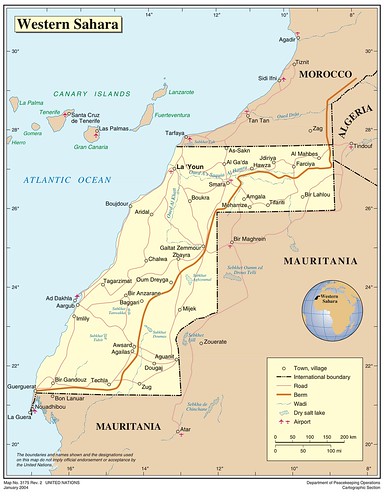Phosphate: A Critical Resource Misused and Now Running Low
Posted by Big Gav in agriculture, peak phosphorus, phosphorus, western sahara
Yale Environment 360 has an article on phosphorus depletion - Phosphate: A Critical Resource Misused and Now Running Low.
Phosphate has been essential to feeding the world since the Green Revolution, but its excessive use as a fertilizer has led to widespread pollution and eutrophication. Now, many of the world’s remaining reserves are starting to be depleted.
If you wanted to really mess with the world’s food production, a good place to start would be Bou Craa, located in the desert miles from anywhere in the Western Sahara. They don’t grow much here, but Bou Craa is a mine containing one of the world’s largest reserves of phosphate rock. Most of us, most days, will eat some food grown on fields fertilized by phosphate rock from this mine. And there is no substitute.
The Western Sahara is an occupied territory. In 1976, when Spanish colonialists left, its neighbor Morocco invaded, and has held it ever since. Most observers believe the vast phosphate deposits were the major reason that Morocco took an interest. Whatever the truth, the Polisario Front, a rebel movement the UN recognizes as the rightful representatives of the territory, would like it back.
Not many people would call phosphate a critical issue or one with serious environmental consequences. But even leaving aside the resource politics of the Sahara, it is an absolutely vital resource for feeding the world. It is also a resource that could start running low within a couple of decades — and one we grossly misuse, pouring it across the planet and recycling virtually none of it.
The world’s food supplies are alarmingly dependent on the phosphate fertilizer that is hewn from the desert of the Western Sahara. The vast open-cast mine at Bou Craa delivers several million tons of phosphate rock every year down a 150-kilometer-long conveyor belt, the world’s longest, to the Atlantic port of El Ayoun. From there, it is distributed around the world and made into fertilizer.
Morocco’s phosphate reserves are owned by the Office Cherifien des Phosphates, a Moroccan state agency. Given the almost unlimited executive powers of the Moroccan monarch, it might reasonably be said that most of the world's known reserves of phosphate are, in effect, owned by King Mohammed VI and his Alaouite dynasty, which has reigned in Morocco since the 17th century.
If the people of Western Sahara ever resume their war to get their country back — or if the Arab Spring spreads and Morocco goes the way of Libya — then we may be adding phosphate fertilizer to the list of finite resources, such as water and land, that are constraining world food supplies sooner than we think.






